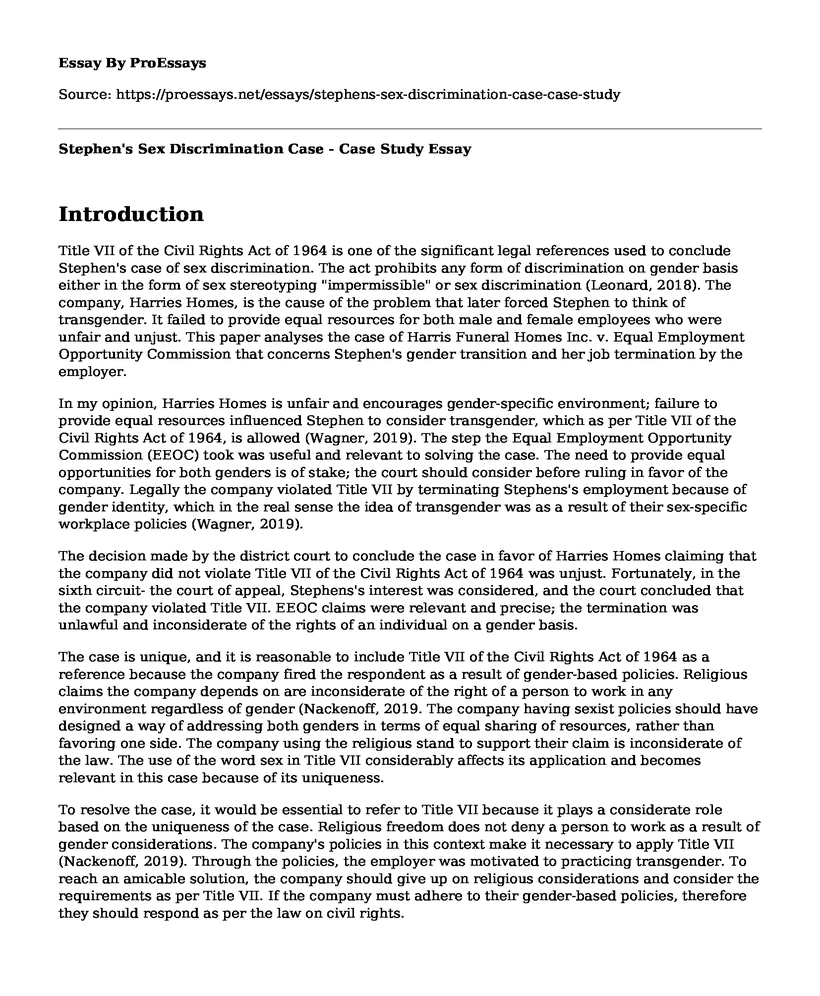Introduction
Title VII of the Civil Rights Act of 1964 is one of the significant legal references used to conclude Stephen's case of sex discrimination. The act prohibits any form of discrimination on gender basis either in the form of sex stereotyping "impermissible" or sex discrimination (Leonard, 2018). The company, Harries Homes, is the cause of the problem that later forced Stephen to think of transgender. It failed to provide equal resources for both male and female employees who were unfair and unjust. This paper analyses the case of Harris Funeral Homes Inc. v. Equal Employment Opportunity Commission that concerns Stephen's gender transition and her job termination by the employer.
In my opinion, Harries Homes is unfair and encourages gender-specific environment; failure to provide equal resources influenced Stephen to consider transgender, which as per Title VII of the Civil Rights Act of 1964, is allowed (Wagner, 2019). The step the Equal Employment Opportunity Commission (EEOC) took was useful and relevant to solving the case. The need to provide equal opportunities for both genders is of stake; the court should consider before ruling in favor of the company. Legally the company violated Title VII by terminating Stephens's employment because of gender identity, which in the real sense the idea of transgender was as a result of their sex-specific workplace policies (Wagner, 2019).
The decision made by the district court to conclude the case in favor of Harries Homes claiming that the company did not violate Title VII of the Civil Rights Act of 1964 was unjust. Fortunately, in the sixth circuit- the court of appeal, Stephens's interest was considered, and the court concluded that the company violated Title VII. EEOC claims were relevant and precise; the termination was unlawful and inconsiderate of the rights of an individual on a gender basis.
The case is unique, and it is reasonable to include Title VII of the Civil Rights Act of 1964 as a reference because the company fired the respondent as a result of gender-based policies. Religious claims the company depends on are inconsiderate of the right of a person to work in any environment regardless of gender (Nackenoff, 2019. The company having sexist policies should have designed a way of addressing both genders in terms of equal sharing of resources, rather than favoring one side. The company using the religious stand to support their claim is inconsiderate of the law. The use of the word sex in Title VII considerably affects its application and becomes relevant in this case because of its uniqueness.
To resolve the case, it would be essential to refer to Title VII because it plays a considerate role based on the uniqueness of the case. Religious freedom does not deny a person to work as a result of gender considerations. The company's policies in this context make it necessary to apply Title VII (Nackenoff, 2019). Through the policies, the employer was motivated to practicing transgender. To reach an amicable solution, the company should give up on religious considerations and consider the requirements as per Title VII. If the company must adhere to their gender-based policies, therefore they should respond as per the law on civil rights.
In my view, the supreme court will rule in favor of Stephens because the work environment is grounded with gender-based policies and not religious norms, therefore applying the Title VII act may be considered by the supreme court as relevant to the case. The court will possibly consider he canopy to have violated Title VII of the Civil Rights Act of 1964 by firing the respondent to conclude the matter amicably.
References
Leonard, A. S. (2018). High Court Conferences Title VII Cases Next Week.
Nackenoff, C. (2019). The Supreme Court Hears Arguments on The Meaning Of "Sex Discrimination." The Gender Policy Report.
Wagner, R. B. (2019). Working in the State of Flux. Michigan Bar Journal, 30.
Cite this page
Stephen's Sex Discrimination Case - Case Study. (2023, Apr 20). Retrieved from https://proessays.net/essays/stephens-sex-discrimination-case-case-study
If you are the original author of this essay and no longer wish to have it published on the ProEssays website, please click below to request its removal:
- Do Background Checks Actually Work to Deter Crime? - Essay Sample
- Blaming the Victim Paper Example
- Research Paper on Gun Control Measures in the United States
- Essay Sample on Password Cracking Attacks
- Essay on Forensic Serology: Observing, Grouping & Classifying Body Fluids in Crime Scenes
- Essay Sample on Jury Decision Making: Investigating Race and Interracial Elements
- Essay Example on Jury in the Courtroom: Ensuring Impartial Justice and Reasonableness







